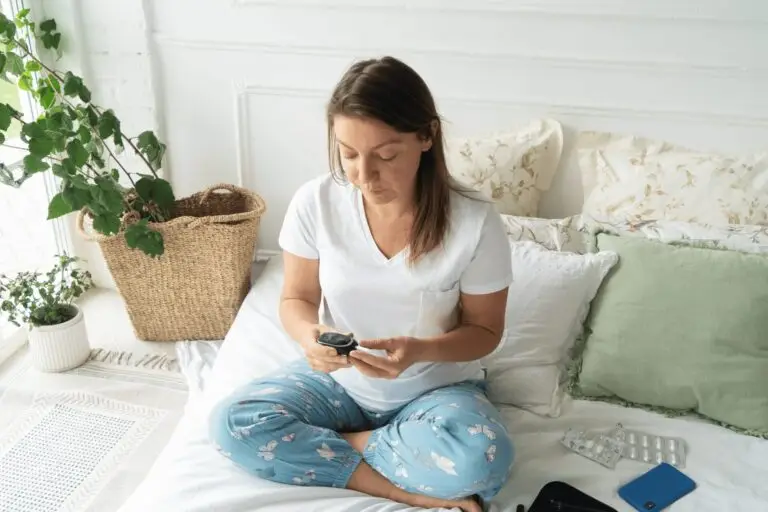Introduction: Could "Sleep to Lower Blood Sugar" Be Your Health Game-Changer?
Tossing and turning at night? Your blood sugar might be paying the price. In 2025, with over 643 million adults battling diabetes globally (International Diabetes Federation), mastering blood sugar control is a health priority. Poor sleep doesn’t just sap your energy—it spikes glucose levels, raising risks of heart disease, nerve damage, and more. But here’s the good news: your quality sleep is the foundation of the “Sleep to Lower Blood Sugar” strategy, a secret weapon to stabilize your glucose and reclaim your vitality.
This guide uncovers the surprising link between blood sugar and sleep, delivering science-backed strategies to optimize both. From crafting the perfect bedtime routine to choosing sleep-friendly foods, you’ll discover how to rest better and lower blood sugar naturally. Ready to wake up refreshed with steadier glucose? Let’s get started.
The Hidden Connection Between Blood Sugar and Sleep.
Sleep isn’t just rest—it’s a powerhouse for blood sugar regulation. Skimp on shut-eye, and your glucose levels can spiral out of control. Here’s why sleep and blood sugar are so deeply intertwined.
Why Poor Sleep Sabotages Blood Sugar
Hormone Havoc: Lack of sleep spikes cortisol and stress hormones, pushing blood sugar higher (Journal of Clinical Endocrinology & Metabolism, 2024).
Insulin Resistance: Less than 7 hours of sleep reduces insulin sensitivity, making glucose harder to manage (Diabetes Care, 2023).
Craving Overdrive: Sleep deprivation boosts ghrelin, the hunger hormone, tempting you with sugary snacks that spike glucose.
How Quality Sleep Saves the Day
Steadies Glucose: 7–9 hours of rest optimizes insulin function, keeping blood sugar stable.
Lowers Stress: Deep sleep cuts cortisol, preventing glucose spikes.
Powers Healthy Choices: Better rest fuels energy for exercise and smarter food decisions.
Learn how stress impacts glucose in our guide on lifestyle changes to lower blood sugar.
How Much Sleep Do You Need to Lower Blood Sugar?
For optimal blood sugar control, adults need 7–9 hours of quality sleep nightly, per the National Sleep Foundation. Consistency is crucial—irregular sleep patterns disrupt your body’s glucose-regulating clock.
Sleep Duration | Impact on Blood Sugar |
<6 hours | Spikes insulin resistance, elevates fasting glucose |
7–9 hours | Boosts insulin sensitivity, stabilizes glucose |
>9 hours | May disrupt metabolism if excessive |
Quick Tip: Stick to a fixed bedtime and wake-up time, even on weekends, to keep your glucose levels steady.
5 Science-Backed Ways to Sleep Better and Lower Blood Sugar
Ready to transform your sleep and take control of your blood sugar? These proven strategies will help you rest deeply and stabilize glucose.
1. Design Your Dream Sleep Sanctuary
A calming bedroom sets the stage for restorative sleep.
Go Dark: Blackout curtains block light that disrupts melatonin, your sleep hormone.
Stay Cool: Keep your room at 60–67°F (15–20°C) for optimal rest.
Embrace Quiet: Use earplugs or a white noise machine to silence distractions.
Action Step: Banish electronics and declutter your space for a zen-like vibe.
2. Lock in a Consistent Sleep Schedule
A steady sleep routine aligns your circadian rhythm, keeping blood sugar in check.
How to Do It: Pick a bedtime that allows 7–9 hours of sleep (e.g., 10 PM for a 6 AM wake-up).
Why It Works: Regularity reduces cortisol spikes that elevate glucose (Sleep Medicine Reviews, 2024).
Action Step: Set a nightly alarm to remind you to wind down.
3. Ditch Screens for Sweeter Dreams
Blue light from phones or tablets suppresses melatonin, delaying sleep and spiking blood sugar.
Action Step: Power down screens 1–2 hours before bed or use blue-light-blocking glasses.
Try Instead: Read a book, journal, or listen to calming music to ease into sleep.
Explore relaxation techniques in our guide on natural remedies to lower blood sugar.
4. Craft a Relaxing Pre-Bed Ritual
A soothing routine signals your body it’s time to rest, keeping glucose stable.
Power Move: Practice the 4-7-8 breathing technique (inhale 4 seconds, hold 7, exhale 8).
Add In: Try 10–15 minutes of gentle yoga or meditation to melt away stress.
Avoid: Heavy meals, caffeine, or alcohol 3–4 hours before bed—they can spike blood sugar.
5. Track Sleep and Blood Sugar for Results.
Monitoring reveals how sleep impacts your glucose levels.
Tools: Use a glucometer or continuous glucose monitor (CGM) to check fasting and post-meal levels.
Target Ranges (American Diabetes Association):
Fasting: 80–130 mg/dL
Post-meal (2 hours): <180 mg/dL
Action Step: Log sleep hours and glucose readings to spot trends and fine-tune your routine.
Get the full scoop on tracking in our guide on monitoring blood sugar levels.
Sleep-Friendly Foods to Lower Blood Sugar
Your evening eats can make or break your sleep and glucose control. Choose foods that promote rest and avoid those that disrupt it.
Top Foods for Better Sleep and Blood Sugar.
Almonds: Packed with magnesium for relaxation and insulin sensitivity.
Serving: ¼ cup, 1–2 hours before bed.
Cherries: Natural melatonin source to enhance sleep quality.
Serving: ½ cup fresh cherries or 1 oz tart cherry juice.
Greek Yogurt: High-protein, low-carb option to stabilize overnight glucose.
Serving: ½ cup unsweetened with a few berries.
Food | Key Benefit | Serving Size |
Almonds | Magnesium | ¼ cup |
Cherries | Melatonin | ½ cup |
Greek Yogurt | Protein | ½ cup |
Find more glucose-friendly foods in our guide on foods to lower blood sugar
Foods to Skip Before Bed
Sugary Treats: Cookies or soda cause glucose spikes and disrupt sleep.
Caffeine: Coffee or energy drinks keep you awake and raise cortisol.
Heavy Meals: Large, high-fat meals slow digestion, impacting glucose.
Quick Tip: Finish eating 2–3 hours before bed to stabilize glucose overnight.
Avoid These Sleep and Blood Sugar Traps.
Steer clear of these common mistakes to maximize your results:
Erratic Bedtimes: Inconsistent schedules disrupt your circadian rhythm, spiking glucose.
Late-Night Screen Time: Blue light delays sleep, raising blood sugar.
Overeating at Night: Sugary or heavy snacks cause overnight glucose spikes.
Ignoring Stress: Unmanaged stress elevates cortisol, harming sleep and glucose.
Discover stress-busting tips in our guide on lifestyle changes to lower blood sugar.
Exercise: The Perfect Partner for Sleep and Blood Sugar..
Physical activity boosts sleep quality and glucose control, creating a win-win for your health.
Best Choices: Walking, cycling, or strength training (e.g., bodyweight squats).
Timing Matters: Exercise in the morning or afternoon. Avoid intense workouts 2–3 hours before bed to prevent sleep disruption.
How Much: Aim for 30 minutes, 5 days a week, per American Diabetes Association guidelines.
FAQs About Blood Sugar and Sleep
- How does sleep impact blood sugar levels?
Poor sleep spikes cortisol and insulin resistance, raising glucose. Quality sleep (7–9 hours) stabilizes blood sugar.
2. Can better sleep lower blood sugar fast?
Yes, consistent 7–9 hour sleep can improve insulin sensitivity within days. Monitor levels to see results.
3. What’s the best bedtime routine for blood sugar control?
Skip screens, try 4-7-8 breathing, and eat a low-GI snack like almonds 2 hours before bed.
4. Which foods help both sleep and blood sugar?
Almonds, cherries, and Greek yogurt promote rest and glucose stability with magnesium, melatonin, and protein.
5. How do I track sleep’s effect on blood sugar?
Use a glucometer or CGM to monitor fasting (80–130 mg/dL) and post-meal (<180 mg/dL) levels, noting sleep hours.
6. Can oversleeping raise blood sugar?
Sleeping over 9 hours may disrupt metabolism, potentially increasing glucose. Aim for 7–9 hours.
7. When should I see a doctor about sleep and blood sugar?
Consult a doctor if blood sugar stays above 180 mg/dL, or you face insomnia or symptoms like fatigue.
Explore medical options in our guide on medical treatments for high blood sugar
Conclusion: Sleep Your Way to Better Blood Sugar Today.
Don’t let poor sleep derail your blood sugar goals. With 7–9 hours of quality rest, a calming bedtime routine, and smart food choices, you can stabilize glucose and wake up energized. Start tonight—set a consistent bedtime, swap late-night scrolling for a relaxing ritual, and snack on almonds for a glucose-friendly boost.
Take the next step! Download our free Sleep & Blood Sugar Toolkit for personalized strategies to master your rest and glucose control.
Hurry up! Get 25% off now for a limited time offer.




